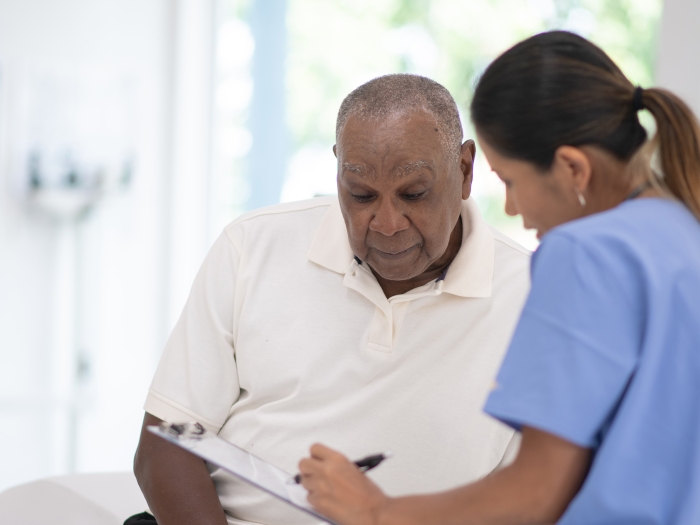What do you do when you’re diagnosed with an ultra-rare disease? For one patient, the answer was simple: Find the experts and never give up.
1:00 PM
Author |

Fred Prindle was 50 years old and in excellent shape.
MORE FROM MICHIGAN: Subscribe to our weekly newsletter
A recently retired Navy veteran, his daily exercise regimen included 3 miles of running a day and 18 miles on the bike three times a week. To mark his 50th birthday milestone, he challenged himself to complete three mini-triathlons in one year. And Fred Prindle does not back down from a challenge.
But by his third triathlon that summer, he was starting to slow down a little. Prindle laughed it off at the time, but wonders in hindsight if this was the first sign of a bigger challenge to come.
"I was struggling, I think," he remembers. "Looking back, maybe my cancer was holding me back. I couldn't get my speed up."
A sudden diagnosis
Prindle's military career of three decades had taken his family up and down the East Coast. Now that it was over, he and his wife, Mary — sweethearts since high school — moved to Louisville, Kentucky, where they were looking forward to spending time with their grandchildren, and had plans for some serious traveling.
Just a few months later, everything changed.
It started with a twinge in his side. It was an unfamiliar pain, and he and Mary decided it was something he needed to have looked at.
Within a few days, he had a diagnosis: adrenal cortical carcinoma (ACC) — cancer in one of the adrenal glands that sit atop the kidneys. It's an extremely rare disease that affects just one or two people per million each year, and one that has a reputation as a swift killer.
Fred was told that his tumor was stage 4, the most serious, with evidence of spread to other organs and couldn't be removed. He was given three months to a year to live at the most.
But Fred Prindle does not back down from a challenge.
Making connections
About 350 miles separate Louisville, Kentucky, and Ann Arbor, Michigan. Faced with the diagnosis of an ultra-rare disease, however, distance was simply one more challenge to overcome.
SEE ALSO: Finding Cancer Care Thanks to a Rare Genetic Mutation
"Mary and I got on the internet and learned everything we could about adrenal cancer," says Prindle. "And everything we read led us to Michigan. All the latest reports on research about the disease. Everything pointed to Michigan. So we set our minds on it."
The adrenal cancer program at the University of Michigan Rogel Cancer Center, headed by Gary Hammer, M.D., Ph.D., is one of just a few programs in the country dedicated to the research and treatment of this rare disease and cares for patients from around the world.
The program is associated with legendary Michigan head football coach Bo Schembechler, who helped raise money to establish the Millie Schembechler Professorship in Adrenal Cancer in memory of his wife's personal struggle against adrenal cancer and to advance the understanding and treatment of this rare disease.
The Prindles discovered the Cancer Center's Remote Second Opinion program, which allowed them to have Fred's case reviewed by the ACC experts at Michigan without having to travel to Ann Arbor.
For convenience and quality of care, the arrangement was a blessing.
"Without the initial remote second opinion, I am not sure where I would be today," says Prindle. "Dr. Hammer and his team had my CT scans sent to Michigan, where they were able to evaluate them with the tumor board. They've been the primary source of my treatment, and Dr. Moffett at Brown Cancer Center in Louisville has been following their recommendations to a T."
Results and relief
After six rounds of chemotherapy, Prindle's tumor shrank by 30 percent, and the care team at Michigan determined that he was eligible for surgery when others said he was not.
His surgeon, Barbra Miller, M.D., says that her patient was doubly lucky. Historically, stage 4 patients have not been eligible for surgery, but his tumor reacted remarkably well to the chemotherapy.
Prindle's first bit of luck, though, was being turned down for surgery when he was first diagnosed.
"The most important part in treating adrenal cancer is that first operation," Miller explains. "You get one chance to cure the patient or minimize the chance of local recurrence. When you have a surgeon with less experience dealing with such a unique and aggressive cancer, you have less of a chance of success.
"The operation we do for adrenal cancer is very different than what we do for patients who have benign adrenal tumors. We wish we could see more patients prior to having surgery rather than seeing them after they may have had a less than optimal surgery somewhere else less experienced in caring for patients with adrenal cancer."
Miller says that most surgeons only see a couple of cases of adrenal cancer in their careers, if they see any at all. But Michigan's dedicated adrenal cancer program sees or provides input on the care of six to 10 patients a week.
With that many patients, "you start to recognize patterns that allow us to more effectively treat this type of cancer," Miller says.

Finding gratitude
These days, three years after that first diagnosis, Prindle keeps busy.
Although he had to give up running, he still likes to bike, get out in the kayak, and maybe get out on the water for "a little bit of fishing here and there." He loves to spend time playing with his grandkids.
Travel is a priority, too: Look at his recent vacation photos and you'll see him paddleboarding in Key West, Florida, or leaping in front of Mayan ruins in Mexico.
Still, health challenges remain. Prindle is now taking an experimental drug for nodules on his lungs, and recently discovered that his cancer has metastasized to his hip.
Prindle, who is active in online support groups, offers advice to those who have been recently diagnosed or are struggling with treatment: Be your own advocate.
And, as his experience shows, the best treatment option might not be in one's backyard.
"Research everything you can on your disease — and, if it's at all financially possible, seek out the experts. For me and my disease, everything that was written was out of Michigan, so I knew that this was where I needed to go for treatment. We had to petition the insurance company and went back and forth quite a bit. But we never gave up."
In that lifelong spirit of facing challenges head-on, he keeps a positive outlook.
"In retrospect, through it all, I've had it pretty easy, especially compared to other cancers and other disabilities," Prindle says. "It's been a pretty low-impact cancer. I remember asking Dr. Hammer where I stand in the grand scheme of ACC survivors. He told me: 'You survived. You were able to take the meds. You got through surgery.' All in all, I'm doing pretty well. I may not be the Superman story everybody hopes for, but I try to be inspirational.
"People ask me sometimes how I can be so positive," he continues. "Well, either you're going to stick your head in the sand and forget about life or you'll have hope. I think with my faith and my time in the Navy and the wonderful people I've met and my family upbringing, I can't help but be positive."
Fred Prindle died on June 16, 2017.

Explore a variety of health care news & stories by visiting the Health Lab home page for more articles.

Department of Communication at Michigan Medicine
Want top health & research news weekly? Sign up for Health Lab’s newsletters today!




